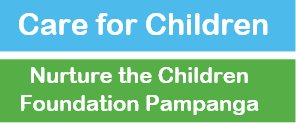A REWARDING 7th VISIT TO RSCC & AMOR
By Quinten Schouten, SPED Teacher from The Netherlands
I have volunteered for Care for Children & Nurture the Children since 2005. I am glad that I can finally come back to share knowledge after the pandemic. October 2022 is my 7th visit to RSCC in Lubao and Amor Village in Tarlac.
Orange House, RSCC Lubao
Six children with severe multiple disabilities (cerebral palsy) live in this cottage. Glad to note that all six children are adequately nourished.
A few years ago, these children needed more nutrients, not because of food shortage but because there needed to be knowledge of what these special children need in their diet. Thanks to the visit of a dietician, Rian Korf-Roose from the Netherlands. She taught the caregivers an American program that uses a special diet, including extra fat and proteins and uses special spoons and cups. Children are now monitored for height and weight, and blood samples are regularly tested for iron levels.

Adding to the children’s delight is a giant new swing installed in the Orange House, especially for children with physical disabilities.

Nursery, RSCC Lubao, Pampanga
Sherborne Developmental Movement activity is practised in the baby and toddler group. Sherborne games are played weekly, so the toddlers know the games and exercises. The caregivers are caring and communicative, precisely as needed. Together we have expanded the game’s repertoire with new Sherborne games.

Amor Village
I saw many acquaintances in Amor Village, staff members who have been working there for a long time, and residents I have known for 17 years.
Amor Village is beautifully and sustainably maintained. In this centre, all residents have a simple but valuable task to contribute. One resident loves to hang newly washed clothes & linens, and another arranges all clothes hangers so well, like how they are set up in the store. In contrast, another enjoys mopping the floor, and one keeps himself busy cutting vegetables for the pigs. When everyone does what they want, the centre is spick and span, and other chores are accomplished in no time. In the Netherlands, not all residents are given a chance to do such simple tasks.

Sherborne Developmental Movement
I also did a seminar for Sherborne Developmental Movement for the new personnel and a follow-up seminar for the rest of the caregivers. Glad to note that new personnel learned from those who underwent the workshop a few years ago.


Indeed, the residents enjoyed the games in their way. Caregivers were enthusiastic and happy to increase the tempo as they went along. We performed most of the games during the workshop with the staff. Sherborne Developmental Movement can only be learned with practice. Then I added a piece of theory. It is best to be sensitive to the children’s response and stick to the same game for a few moments longer rather than quickly finishing all games.
Sensory stimulation
We also did a repeat workshop on sensory stimulation—residents on low-level development play through their senses. I used toys and materials to stimulate their minds. It is essential that the child gets the time to play independently and that the caregiver only provides a safe environment with a diverse range and observes the children to see what they like to be able to offer variation and expansion. Play materials can consist of toys and other materials such as brushes, fans, feather dusters and empty bottles with a stone as a rattle.

Sensory processing problem solutions.
The last seminar I gave was completely new in terms of content. This workshop was for Social Workers and Special Education teachers.
The topic was: Solutions for children with sensory processing problems in the classroom.
We first went deeper into the processing of sensory stimuli and learned to look through imaginary sensory glasses. We then used a model (the Fan model) to see in which phase your senses can best perceive the information, which works best if you are alert. Afterwards, we discussed how you could see if a child is not alert but undersensitive or hypersensitive and how you can help the child. The techniques for this, such as breathing and hand pushing, have been discussed, and the materials that can be helpful, such as fidget toys (poppers, spinning tops, stress balls, spinners) and teething toys, have been offered and demonstrated.

The teachers and social workers continue sharing new stimulus-processing knowledge with the house parents.
I thank all the RSCC and Amor Village staff and residents for their sustainability insights, which were shared with me. The knowledge I gained here, I will take back to the Netherlands.
I thank Care For Children Foundation for making this visit possible!


